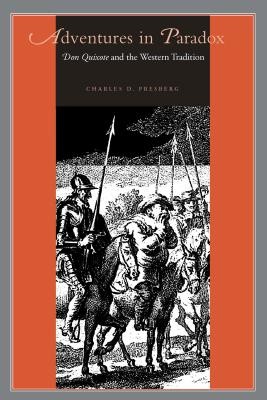
- We will send in 10–14 business days.
- Author: Charles D Presberg
- Publisher: Penn State University Press
- ISBN-10: 0271023643
- ISBN-13: 9780271023649
- Format: 16 x 23.3 x 1.5 cm, softcover
- Language: English
- SAVE -10% with code: EXTRA
Reviews
Description
Cervantes's Don Quixote confronts us with a series of enigmas that, over the centuries, have divided even its most expert readers: Does the text pursue a serious or comic purpose? Does it promote the truth of history and the untruth of fiction, or the truth of poetry and the fictiveness of truth itself? In a book that will revise the way we read and debate Don Quixote, Charles D. Presberg discusses the trope of paradox as a governing rhetorical strategy in this most canonical of Spanish literary texts.
To situate Cervantes's masterpiece within the centuries-long praxis of paradoxical discourse in the West, Presberg surveys its tradition in Classical Antiquity, the Middle Ages, and the European Renaissance. He outlines the development of paradoxy in the Spanish Renaissance, centering on works by Fernando de Rojas, Pero MexÃa, and Antonio de Guevara. In his detailed reading of portions of Don Quixote, Presberg shows how Cervantes's work enlarges the tradition of paradoxical discourse by imitating as well as transforming fictional and nonfictional models. He concludes that Cervantes's seriocomic "system" of paradoxy jointly parodies, celebrates, and urges us to ponder the agency of discourse in the continued refashioning of knowledge, history, culture, and personal identity.
This engaging book will be welcomed by literary scholars, Hispanisists, historians, and students of the history of rhetoric and poetics.
EXTRA 10 % discount with code: EXTRA
The promotion ends in 20d.03:30:06
The discount code is valid when purchasing from 10 €. Discounts do not stack.
- Author: Charles D Presberg
- Publisher: Penn State University Press
- ISBN-10: 0271023643
- ISBN-13: 9780271023649
- Format: 16 x 23.3 x 1.5 cm, softcover
- Language: English English
Cervantes's Don Quixote confronts us with a series of enigmas that, over the centuries, have divided even its most expert readers: Does the text pursue a serious or comic purpose? Does it promote the truth of history and the untruth of fiction, or the truth of poetry and the fictiveness of truth itself? In a book that will revise the way we read and debate Don Quixote, Charles D. Presberg discusses the trope of paradox as a governing rhetorical strategy in this most canonical of Spanish literary texts.
To situate Cervantes's masterpiece within the centuries-long praxis of paradoxical discourse in the West, Presberg surveys its tradition in Classical Antiquity, the Middle Ages, and the European Renaissance. He outlines the development of paradoxy in the Spanish Renaissance, centering on works by Fernando de Rojas, Pero MexÃa, and Antonio de Guevara. In his detailed reading of portions of Don Quixote, Presberg shows how Cervantes's work enlarges the tradition of paradoxical discourse by imitating as well as transforming fictional and nonfictional models. He concludes that Cervantes's seriocomic "system" of paradoxy jointly parodies, celebrates, and urges us to ponder the agency of discourse in the continued refashioning of knowledge, history, culture, and personal identity.
This engaging book will be welcomed by literary scholars, Hispanisists, historians, and students of the history of rhetoric and poetics.


Reviews